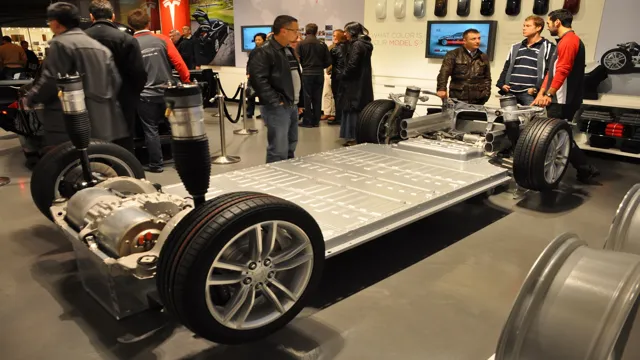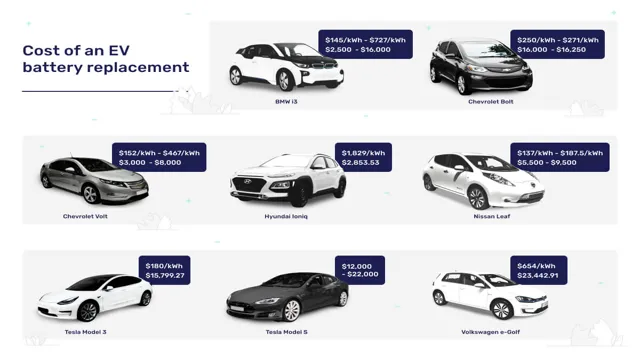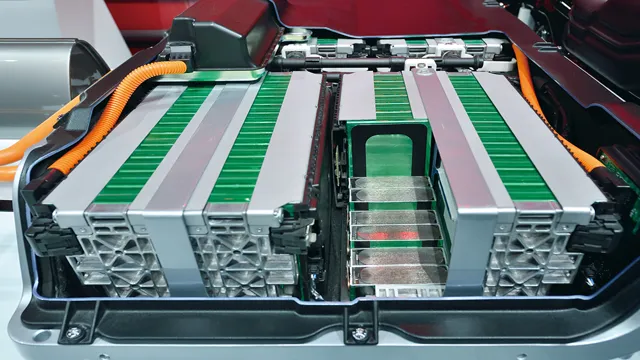The Shocking Truth: The Environmental Cost of Electric Car Batteries Unveiled
Electric cars have been lauded as the future of the automotive industry, as they promise a cleaner mode of transportation. The switch to electric cars seems to be a no-brainer, as they’re environmentally-friendly and have the potential to reduce carbon emissions. However, the environmental cost of electric car batteries is something that is often overlooked, and it’s important to consider before making the switch.
While electric car batteries have come a long way in terms of efficiency and longevity, they still have their fair share of environmental implications. As exciting as the prospect of driving an electric car may be, what many fail to realize is that the production of electric car batteries requires a great deal of energy, which has a significant environmental impact. The production process involves the extraction and processing of raw materials, including cobalt, nickel, and lithium, which have to be mined and transported from various parts of the world.
The energy used in the manufacturing process, coupled with the transportation costs, leads to a substantial carbon footprint, which impacts the environment. Furthermore, electric car batteries have a limited lifespan, which means they will eventually need to be replaced. The disposal of used batteries is another environmental concern, as they contain toxic chemicals that can be harmful if not disposed of correctly.
The recycling process of electric car batteries is still in its infancy, which poses an environmental risk as the demand for electric cars continues to grow. In conclusion, while electric cars may have the potential to revolutionize the automotive industry and reduce carbon emissions, it’s essential to recognize the environmental cost associated with battery production and disposal. The transition to electric cars must be carefully planned to minimize their environmental impact, and steps must be taken to develop sustainable battery recycling methods.
As consumers, it’s important to consider both the benefits and drawbacks of electric cars before making the switch.
What makes electric car batteries bad for the environment?
Electric car batteries are often touted as a beacon of hope for reducing our carbon footprint and promoting eco-friendliness. However, the environmental cost of manufacturing and disposing of these batteries is often overlooked. Electric car batteries contain numerous toxic chemicals, including lead, nickel, and lithium, which can be hazardous to the natural environment if not handled correctly.
Additionally, the manufacturing of these batteries requires a lot of energy, contributing to greenhouse gas emissions and further exacerbating the climate crisis. Even the disposal process can have detrimental effects, as incorrect disposal methods can cause the battery’s toxic chemicals to pollute the soil and water systems. In essence, we need to find more sustainable ways to manufacture and dispose of these batteries in order to truly promote eco-friendliness.
Mining for materials
Electric car batteries are often hailed as a cleaner and more eco-friendly alternative to traditional gasoline-powered vehicles. However, there are some downsides to these batteries that need to be considered. One of the primary concerns is the mining of materials necessary for their production.
Many of the metals used in electric car batteries, such as nickel, manganese and cobalt, are typically mined in countries with lax environmental regulations. This can result in extensive land and water pollution, as well as the displacement of indigenous communities. Additionally, the mining process itself can be energy-intensive and therefore produce significant amounts of greenhouse gas emissions.
While electric cars may have the potential to reduce fossil fuel dependence and air pollution, the environmental cost of producing their batteries needs to be more carefully considered if we truly want to achieve sustainable transportation.
Manufacturing process
Electric car batteries have become increasingly popular in recent years due to the rise in environmentally conscious consumers. However, the manufacturing process of these batteries can have negative impacts on the environment. The process starts with mining the metals, such as cobalt, nickel, and lithium, needed to create the battery cells.
This mining process can lead to deforestation, soil erosion, water pollution, and displacement of local communities. Additionally, the production of these metals requires a significant amount of energy, often from non-renewable sources, which contributes to greenhouse gas emissions. Once the metals have been extracted, they are transported and processed in energy-intensive factories, further adding to the carbon footprint of the battery.
As a result, while electric cars may help reduce emissions during their operation, it is important to consider the environmental impact of their manufacturing process.
What are the environmental benefits of electric cars?
One of the biggest environmental benefits of electric cars is their ability to greatly reduce pollution. Unlike traditional gasoline-powered vehicles, electric cars produce zero emissions during operation. This means that they don’t contribute to air pollution or smog, which can have detrimental effects on both human health and the environment.
While it’s true that the production and disposal of electric car batteries do have an environmental cost, researchers have found that this pales in comparison to the lifetime emissions savings of electric cars. Additionally, as technology continues to advance, the environmental impact of battery production and disposal is likely to decrease. So, while electric cars aren’t perfect, they offer a legitimate and important way to reduce greenhouse gas emissions and help combat climate change.
Reduced emissions
Reduced emissions Electric cars have a number of environmental benefits, one of the most significant being reduced emissions. Unlike traditional gasoline cars, electric vehicles do not produce harmful pollutants like carbon dioxide, nitrogen oxide, and particulate matter. This contributes to improved air quality, reduces the greenhouse gas emissions that cause global warming, and helps fight climate change.
The adoption of electric vehicles can also reduce our dependence on oil, further decreasing the amount of pollution caused by extracting, refining, and transporting oil. By choosing an electric car, you can do your part in helping create a cleaner and more sustainable planet.
Reduced reliance on fossil fuels
Reduced reliance on fossil fuels Electric cars offer numerous environmental benefits, including reducing our reliance on fossil fuels. By swapping out gasoline engines for electric motors, we can drastically reduce our consumption of oil and the associated greenhouse gas emissions. As an added bonus, electric cars run on clean, renewable energy sources, such as wind and solar power, which further reduces their environmental impact.
In fact, some countries like Norway have already set ambitious goals to phase out gas-powered vehicles entirely by 202 While electric cars may not be perfect, they are a step in the right direction towards a greener future. The more we adopt this technology, the closer we get to reducing our reliance on fossil fuels and creating a cleaner planet for future generations to enjoy.
Potential for renewable energy
Renewable energy Electric cars offer numerous environmental benefits, largely due to their potential for utilizing renewable energy sources. These vehicles run on electricity, which can be sourced from renewable sources such as wind, solar, and hydroelectric power. By using renewable energy, electric cars produce zero emissions during operation, making them much cleaner than traditional petrol or diesel vehicles.
This means that not only do they have a smaller carbon footprint, they also improve local air quality, which has a direct positive impact on health. As the use of renewable energy continues to grow, the environmental benefits of electric cars will only increase, making them an important part of the shift towards a cleaner, more sustainable future.
What can be done to mitigate the environmental impact of electric car batteries?
With the increasing popularity of electric cars, concerns have arisen about the environmental cost of their batteries. While electric cars are greener than their gasoline-powered counterparts, the production and disposal of batteries can have serious environmental consequences. To mitigate these impacts, various measures can be taken.
First, manufacturers can use more environmentally-friendly materials in battery production such as nickel and cobalt-reduced cathodes. Second, batteries can be designed to be more recyclable. Third, there can be more comprehensive battery stewardship programs to ensure batteries are disposed of properly.
Finally, advancing battery technology can help reduce the overall environmental cost of batteries. Ultimately, it will take a combination of these strategies, as well as continued innovation, to ensure that electric car batteries have as little environmental impact as possible.
Battery recycling and disposal
Battery recycling and disposal can be challenging, as electric car batteries are large and complex. However, efforts have been made to mitigate the environmental impact of these batteries. One solution is to recycle the batteries to recover valuable metals, such as nickel, cobalt, and lithium.
This not only reduces waste but also conserves natural resources. Another solution is to dispose of the batteries safely to prevent hazardous materials from contaminating the environment. Some countries, such as Germany and China, have established battery recycling and disposal regulations to ensure the proper handling of electric car batteries.
As consumers, we can also help by properly disposing of our old batteries and supporting companies that prioritize sustainability and environmental responsibility. By working together, we can minimize the negative impact of electric car batteries on our planet and move towards a more sustainable future.
New battery technologies
Electric car batteries have revolutionized the automotive industry, but concerns about their environmental impact have arisen. To mitigate this impact, new battery technologies are being developed. One promising technology is solid-state batteries, which use a solid electrolyte instead of a liquid one.
This eliminates the need for flammable materials, greatly improving safety and reducing the risk of fires. Furthermore, solid-state batteries have the potential to offer higher energy density than traditional lithium-ion batteries, meaning they can hold more charge in the same amount of space. Another emerging technology is lithium-sulfur batteries, which can offer even higher energy density than solid-state batteries.
However, these batteries are currently less stable and have a shorter lifespan, which means research is needed to improve their durability. These new battery technologies have the potential to substantially reduce the environmental impact of electric car batteries.
Conclusion: Are electric cars worth the environmental cost?
As with any technology, there are pros and cons to electric car batteries. While they offer a cleaner and more sustainable alternative to traditional gasoline engines, they do come with an environmental cost. However, if we continue to invest in research and development, and focus on creating more efficient and eco-friendly battery manufacturing processes, we can mitigate this cost and pave the way for a more sustainable future on the road.
So let’s charge ahead with electric cars, and power towards a brighter, more environmentally conscious tomorrow!”
FAQs
What is the environmental impact of producing electric car batteries?
The production of electric car batteries can have a significant environmental impact due to the mining of raw materials like lithium and cobalt, as well as the energy-intensive manufacturing processes.
How does the cost of electric car batteries compare to traditional gasoline-powered car batteries?
The cost of electric car batteries is typically higher than traditional gasoline-powered car batteries, but the overall cost of ownership can be lower due to lower fuel and maintenance costs.
What is the lifespan of an electric car battery and how often does it need to be replaced?
The lifespan of an electric car battery can vary depending on factors like usage, temperature, and charging habits but generally ranges from 8-10 years. Replacement frequency also depends on these factors and can range from 100,000 to 200,000 miles.
How are electric car batteries recycled and what is the process?
Electric car batteries can be recycled through a process that involves extracting valuable metals from the cells like nickel, cobalt, and lithium. The process typically involves shredding the battery, breaking down the components, and then using various techniques to extract the metals for reuse.





